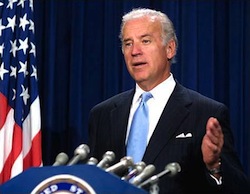Biden to Push for CTBT in Today's Nuclear Policy Speech
February 18, 2010
Featured Image
We are happy to serve you a daily summary of the day's top nuclear policy stories each morning, with excerpts from the stories in bullet form.
Stories we're following today:
Biden to Push Test Ban - Wall Street Journal [link]
- Vice President Joseph Biden will begin the first push for congressional ratification of the United Nations nuclear test-ban treaty since the Clinton presidency, with a speech Thursday saying the Obama administration's large funding request for monitoring will make tests obsolete.
- The 67 votes needed in the Senate to ratify the test-ban treaty, adopted by the U.N. in 1996, are still a ways off, but the administration's challenge to the left is intended to pull key Republican senators on board.
- White House officials hoped Sen. Richard Lugar of Indiana, the ranking Republican on the Senate Foreign Relations Committee, would be a key ally on the broader nuclear agenda, but he wants any push on the test ban put off until the next Strategic Arms Reduction Treaty with Russia is completed and ratified.
- "We don't have the luxury of doing just one thing at a time," said Joseph Cirincione, president of the Ploughshares Fund, an arms-control advocacy group. "These problems are so serious, you've got to move them at several levels all at once."
Remarks by Ellen Tauscher, Undersecretary for International Security and Nonproliferation, at the Second Annual Nuclear Deterrence Summit - The US Department of State [link]
- Our growing knowledge of the reliability of our stockpile, through our stewardship efforts, enables us to safely continue reducing the number of weapons that are the legacy of the Cold War.
- Our primary focus today is no longer deterring a large-scale nuclear conflict between two superpowers, but preventing the use of even a single nuclear weapon.
- We are fully funding Stockpile Management to increase the reliability, safety and security of our nuclear stockpile, to reduce the likelihood that we might resume underground testing, to achieve reductions in the future size of the stockpile, and to reduce the risk of accidental detonation as well as the risk of nuclear terrorism.
The Iran Nuclear Issue: A View from Beijing - The International Crisis Group [link]
- As Western countries prepare to pursue tougher sanctions at the UN, China’s acquiescence as a permanent Security Council member is vital but will be difficult to obtain.
- China’s priorities in Iran go beyond economic interests. Strong bilateral relations help to counter U.S. dominance in the Middle East and increase Beijing’s strategic leverage.
- Chinese officials have been pursuing a delay-and-weaken strategy with regard to UN sanctions by focusing on the importance of a negotiated settlement.
- Nevertheless, if Russia finally supports sanctions, China will likely come on board to avoid diplomatic isolation. Ultimately, Beijing will not side with Iran at the expense of its relations with the U.S. Despite recent troubles in the Sino-U.S. relationship, China still values those ties more than its ties to Tehran.
Nuclear Weapons in Germany: Broaden and Deepen the Debate - George Perkovich for The Carnegie Endowment for International Peace [link]
- In a new paper George Perkovich analyzes the main arguments of Franklin Miller, George Robertson, and Kori Schake in their recent brief criticizing the new German government for proposing the withdrawal of all U.S. nuclear weapons from Germany.
- Among Perkovich's main conclusions: "U.S. nuclear weapons in Europe are often deemed critical for the defense of NATO’s territory, but the bombs are antiquated and operationally unnecessary. What really matters for U.S. and NATO security are reliable commitments to collective defense, the capability to deter today’s threats, and better relations between NATO and Russia."
- “The moral hazard in Europe today is not in taking useless tactical nuclear weapons out, it is in pretending that they can protect allies from twenty-first century threats and doing too little in the meantime to develop capabilities and diplomatic strategies to deny those threats,” Perkovich writes.
A View from the Dark Side
Iran Must Be Stopped - Fox News [link]
- President Obama came to power believing that he unilaterally could disarm Iran with his charm and conciliatory demeanor. He was wrong.
- The president was intentionally derelict or grossly negligent in this missed opportunity. He had the president of Iran in New York.
- Sadly, Obama will turn out to be the Neville Chamberlain of our time.
- Iran must be stopped, and stopped now. Either other responsible nations will join us or we must do the job alone. We have no choice. We must take these rogues at their word and pay attention to their deeds.



